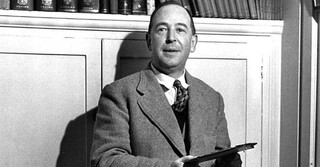5 Relevant Lessons “Mere Christianity” Has for Believers Today
Share

The writer of Ecclesiastes is certainly correct, “of making many books there is no end…” Each month I receive periodicals advertising hundreds of new books in the Christian market. Though we could read a new book each month, there is wisdom in picking up the classics.
C.S. Lewis once advised, “It’s a good rule after reading a new book never to allow yourself another new one till you have read an old one in between.” Since one of Lewis’ works is now well over 50 years old, it falls into the category now of “an old one.” His book Mere Christianity is a must-read for those interested in apologetics, and it is a should read for any believer.
Photo credit: Public Domain Image
Who Wrote Mere Christianity?

Clive Staples (C.S.) Lewis was born in 1898. He also died the day in which President John F. Kennedy was assassinated (Nov. 22, 1963). You have maybe heard the name of C.S. Lewis with the rise of the Chronicles of Narnia series. Lewis was an author of fiction, but he also wrote a few pieces of non-fiction which served as a Christian apologetic.
Lewis’ most well-known fiction works are his Chronicles of Narnia, Space Trilogy, and The Screwtape Letters. The Space Trilogy was written before Lewis became a converted Christian. His more popular non-fiction works are Miracles, The Problem of Pain, Surprised by Joy, and Mere Christianity.
Mere Christianity was not intended to be a book. Most of the material found in the book is actually from a series of BBC radio talks from 1941-1944 during World War II. It was originally published as three separate volumes. But in the summer of 1952 Geoffrey Bles, who had encouraged Lewis to compile these into one apologetic, published the work as Mere Christianity.
Mere Christianity derives its title from Lewis’ aim to give a defense of “the belief that has been common to nearly all Christians at all times” (viii). Lewis presented himself as a “very ordinary layman of the Church of England.” What Lewis is trying to communicate is a defense for what he would call essential Christianity — a core of beliefs that Christians from all circles would agree upon.
His book is a defense that there is a God, and this God saves humanity through the person and work of Jesus Christ. This central claim is packaged in a hodge-podge of philosophical and theological arguments for the existence of God written with a veneer of the common man.
There is much we can learn from Mere Christianity. Here are five lessons for us today:
Photo credit: Unsplash/Bree Anne
Lessons from Mere Christianity

1. We Must Decide What We Will Do with Christ. Neutrality Is Not an Option.
One of Lewis’ most popular apologetics is his Liar, Lord, or Lunatic trilemma. Though Lewis was borrowing from others who previously made similar arguments, he gave the argument its most well-known form:
“I am trying here to prevent anyone saying the really foolish thing that people often say about Him: I’m ready to accept Jesus as a great moral teacher, but I don’t accept his claim to be God. That is the one thing we must not say. A man who was merely a man and said the sort of things Jesus said would not be a great moral teacher. He would either be a lunatic — on the level with the man who says he is a poached egg — or else he would be the Devil of Hell. You must make your choice. Either this man was, and is, the Son of God, or else a madman or something worse. You can shut him up for a fool, you can spit at him and kill him as a demon or you can fall at his feet and call him Lord and God, but let us not come with any patronizing nonsense about his being a great human teacher. He has not left that open to us. He did not intend to…Now it seems to me obvious that He was neither a lunatic nor a fiend: and consequently, however strange or terrifying or unlikely it may seem, I have to accept the view that He was and is God” (Mere Christianity, 55-56).
It has been mentioned that Lewis leaves out an option; namely that of legend. Yet, even if his liar, lord, or lunatic trilemma is not the nail in the coffin that it appears, it is still a useful apologetic. Lewis’ central point is still true — given the claims of Jesus Christ, neutrality is not an option.
At the end of the day, you could come to the conclusion that it is the stuff of legend and that there was not a man named Jesus Christ who made these claims. But even still you need to do business with even this claim. Is that plausible? Is it plausible that Jewish believers would have made such claims? Would they have died for such a myth? Lewis helps frame the argument in such a way that we know what is at stake. You must deal with the claims of Christ.
Photo credit: ©Getty Images/ALLVISIONN
2. If We Truly Listen to Our Desires, They Will Lead Us to Something Higher

Lewis’ most well-known framing of this point actually comes from another work of his, The Weight of Glory. There Lewis makes this argument:
“It would seem that Our Lord finds our desires not too strong, but too weak. We are half-hearted creatures, fooling about with drink and sex and ambition when infinite joy is offered us, like an ignorant child who wants to go on making mud pies in a slum because he cannot imagine what is meant by the offer of a holiday at the sea. We are far too easily pleased.” (The Weight of Glory)
But this is the heart of Lewis’ argument in the beginning section of Mere Christianity. He starts with humanity and their longing for justice and for things to be fair. Lewis then asks where these desires come from. Atheism doesn’t have the answer.
Though there are many more steps necessary to take you to a defense of a Christian God, natural law is an excellent place to begin many apologetic arguments. In one section Lewis discusses the conundrum he found himself in as an atheist. He remained an atheist because he couldn’t get around one central question: How could there be a good God when the world was so awful and unjust? But this question actually cornered him:
“My argument against God was that the universe seemed so cruel and unjust. But how had I got this idea of just and unjust? A man does not call a line crooked unless he has some idea of a straight line. What was I comparing this universe with when I called it unjust?” (38)
Lewis is teaching us how to do apologetics well, which is a third thing we can learn from Mere Christianity.
Photo credit: ©Getty Images/alphaspirit
3. We Can Lead People to Christ by Asking Searching Questions and Putting a “Pebble in the Shoe”

Keep in mind when Lewis first gave these lectures, 1941-1944. Most all of his audience would have been involved in some way in the fight against the Axis powers, led by Nazi Germany. They were evil and every good Englishman was joined together to stop this evil. But how could they rightly say that something was evil?
Lewis knew that his countrymen were borrowing phrases and thinking from a Christian worldview. Even if they had never heard the gospel, they were born with an innate sense of right and wrong. They had the “natural law” of which he spoke in his early chapters. And so, he appealed to this.
One of the better books on apologetics is Tactics, by Greg Koukl. In that resource, Koukl talks about the modest goal of putting a pebble in the shoe of his listeners. It is this strategy that Lewis employs throughout Mere Christianity. Here is Koukl explaining the strategy:
“Now here is my own more modest goal. I want to put a stone in his shoe. All I want to do is give him something worth thinking about. I want him to hobble away on a nugget of truth he can’t simply ignore because it continues to poke at him.”
Mere Christianity progresses from pebble to pebble. He causes the reader to hobble away in each section and then seeks to show how that pebble can be removed. He makes the reader aware of these pebbles and then eventually explains how the Christian gospel is an answer to these truths which are poking the reader.
Photo credit: ©Getty Images/Prathan Chorruangsak
4. The Christian Life Is a Bit Like Being a Rebuilt Home

Lewis is a phenomenal writer who consistently follows his rule of “showing” instead of merely “telling.” In one of his more memorable pictures, he is actually borrowing from George MacDonald. But he has made the picture his own. He likens the Christian life to the rebuilding of a home.
“Imagine yourself as a living house. God comes in to rebuild that house. At first, perhaps, you can understand what He is doing. He is getting the drains right and stopping the leaks in the roof and so on; you knew that those jobs needed doing and so you are not surprised. But presently He starts knocking the house about in a way that hurts abominably and does not seem to make any sense. What on earth is He up to? The explanation is that He is building quite a different house from the one you thought of – throwing out a new wing here, putting on an extra floor there, running up towers, making courtyards. You thought you were being made into a decent little cottage: but He is building a palace. He intends to come and live in it Himself.” (205)
This image can be incredibly helpful in thinking about the process of sanctification. It’s as if in each particular stage of our walk with Christ, there are sections of our house that we are unwilling to open to Christ. We have, as it were, several junk rooms in our life that we’ve shut up and not given access to others. Christ is frequently plumbing the depths of our hearts and transforming every room – even the junk rooms.
Photo credit: ©Getty Images/monkeybusinessimages
5. A Truly Christian Society Would Likely Not Satisfy the “Right” or the “Left”

Lewis’ categories would have been different than our categories today. But his point is especially helpful in our increasingly polarized society. And keep in mind that he originally gave this address when “Christian” Germany was fighting against “Christian” England in a bloody war. Here he talks about how unsatisfactory a truly Christian society might be to all of us:
“If there were such a society in existence and you or I visited it, I think we should come away with a curious impression. We should feel that its economic life was very socialistic and, in that sense, "advanced," but that its family life and its code of manners were rather old-fashioned – perhaps even ceremonious and aristocratic. Each of us would like some bits of it, but I am afraid very few of us would like the whole thing. That is just what one would expect if Christianity is the total plan for the human machine. We have all departed from that total plan in different ways, and each of us wants to make out that his own modification of the original plan is the plan itself. You will find this again and again about anything that is really Christian: every one is attracted by bits of it and wants to pick out those bits and leave the rest. That is why we do not get much further: and that is why people who are fighting for quite opposite things can both say they are fighting for Christianity.” (84-85)
Lewis helps us to see that the society which Christ is forming isn’t beholden to any political party. He also gives this penetrating judgment:
“Most of us are not really approaching the subject in order to find out what Christianity says: we are approaching the subject in order to find out what Christianity says; we are approaching it in the hope of finding support from Christianity for the views of our own party. We are looking for an ally where we are offered either a Master or – a Judge.” (87)
We would do well to consider his words in our day.
What Makes This a Must-Read for Believers?
I’m always a bit hesitant to call anything other than Scripture a “must-read.” But as far as we use that term to mean something like, “you’re really making a poor decision to not read this” I would say that Mere Christianity is one of those classics that falls into a “must-read” category.
It will serve as a model for believers of a faithful apologetic. It will strengthen your faith and equip you to share Christ with others by using Lewis’ method. But it will also strengthen your faith as Lewis explains what it really means to live out Christianity. It’s not only a book about how to become a Christian, it’s also about how to actually be a Christian. And it has just as much value on this front as it does as an apologetic.
If you haven’t read this classic, consider remedying that today.
Photo credit: ©Getty Images/wildpixel